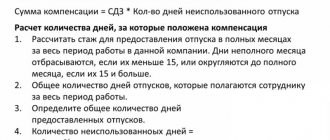Why are personnel documents needed?
The existence of personnel records documents is determined by the norms of the Labor Code of the Russian Federation. For example, Art. 56 of the Labor Code of the Russian Federation establishes the concept of an employment contract, and Art. 212 obliges the employer to create internal regulations that will regulate labor protection. Thus, the need for mandatory personnel documents follows from the norms of the Labor Code of the Russian Federation. In addition, often the preparation of correct personnel documentation allows you to reduce the amount of income tax; for example, many payments in favor of employees can be confirmed by a collective agreement.
Mandatory individual personnel documents
Individual personnel documents include:
- labor contract (form TD-1);
For information on drawing up a contract, see the material “Unified Form No. TD-1 - Employment Contract.”
- employment history;
- administrative document on hiring/dismissal (forms T-1 and T-8, respectively);
For information on using the T-1 form, see the material.
For more information about Order T-8, see the material “Unified Form No. T-8 - form and sample filling.”
- employee personal card (form T-2);
The template for this form can be found in the material “Unified Form No. T-2 - Form and Sample Filling Out”.
- order on the basis of which the employee is transferred (form T-5);
For more information about this form, see the material.
- order for vacation registration (form T-6).
The specified type of document is presented in the material.
Storage periods for organizational and individual documents
Typically, the storage of documents is carried out by an accountant, human resources specialist, lawyer, and secretary. It’s good when there are several employees, and you can entrust one of them with maintaining and storing all this documentation.
And yet, even if the business is small, and the owner does not have time to devote a lot of time to this issue, it is necessary to think about the safety of documents. Here are the storage periods for the main groups of organizational and individual documents (see the List for the full list):
| DOCUMENTATION | STORAGE LIFE |
| Registration documents | constantly |
| Licenses and certificates of conformity | constantly |
| Annual financial statements | constantly |
| Accounting quarterly reporting | 5 years |
| Monthly accounting reports | 1 year |
| Accounting registers, working chart of accounts, accounting policies, correspondence on accounting issues | 5 years |
| Primary accounting documents, books and journals | 5 years |
| Accounting and tax accounting data for the calculation and payment of taxes, documents confirming income and expenses, as well as payment (withholding) of taxes | 4 years |
| Tax returns | 5 years |
| KUDiR for simplified tax system | constantly |
| Annual pay slips to the Social Insurance Fund | constantly |
| Quarterly payslips in the Social Insurance Fund | 5 years |
| Declarations and calculations for insurance contributions for pension insurance | 5 years |
| Agreements and documents related to them (except for leasing and collateral) | 5 years |
| Documents related to CCP | 5 years |
| Occupational safety documents | 5 years |
| Employment contracts | 75 years old |
| Personal files of the organization's leaders | constantly |
| Personal files of employees | 75 years old |
| Personal cards of employees | 75 years old |
| Documents of persons not hired (forms, applications, resumes) | 3 years |
| Original personal documents of employees (work books, diplomas, certificates) | on demand, and unclaimed - 75 years |
| Books, magazines, personnel records cards | 75 years old |
Mandatory personnel documents in a general purpose organization
Among the general purpose personnel documents, the following stand out:
- staffing table (form T-3);
You will find its template in the material “Unified Form No. T-3 - Staffing Schedule (form).”
IMPORTANT! When hiring an employee, his position in the employment contract must correspond to the staffing table (letter of Rostrud dated January 21, 2014 No. PG/13229-6-1).
- vacation schedule (form T-7);
For information on the schedule and the procedure for filling it out, see the material “Unified Form No. T-7 - Vacation Schedule.”
- order to dismiss employees (form T-8a);
- time sheet, on the basis of which the number of hours worked and salary calculation is monitored (forms T-12 and T-13);
For information about the T-12 form, see the material “Unified Form No. T-12 - Form and Sample.”
The structure of the T-13 report card is discussed in the material “Unified Form No. T-13 - Form and Sample.”
- other regulatory documents:
- on labor protection;
- on the protection of personal data;
- collective agreement;
- according to internal regulations;
- on wages and bonuses;
- about trade secrets;
- log books:
- work records;
- contracts;
- sick leaves.
IMPORTANT! Some documents that are required in one situation may not be of equal importance in other circumstances. So, for example, if there is no trade secret clause in the contract with an employee, then there is no need to issue a corresponding provision.
For information about archiving personnel documents, see the material “What is the period for storing personnel documents in an organization?”
Composition of mandatory and optional documents in the personnel work area
In the course of their activities, personnel workers develop, draw up, and execute various documents: local regulations of the employer, contracts (labor, full financial liability, etc.) and agreements with employees, orders, notifications, proposals, acts, certificates, journals. They also work with other documents.
For brevity, we will further call all these documents personnel documents, but we should note that, strictly speaking, not all of them can be classified as purely personnel documents.
Three groups of documents can be distinguished
:
- mandatory - documents in respect of which the law establishes a requirement that the employer must have them, that they must be accepted, concluded, executed, signed (in the event of an inspection, these documents are especially carefully studied by employees of state labor inspectorates),
- documents that become mandatory under certain circumstances,
- optional documents.
In the list of required documents, we will also provide some accounting documents that are mentioned in labor legislation and are required during inspections by the State Labor Inspectorate, for the preparation and execution of which personnel workers are often involved.
If your company is a micro-enterprise, then, according to 309.2 of the Labor Code of the Russian Federation, you may not need to draw up some documents:
“An employer who is a small business entity classified as a micro-enterprise has the right to refuse, in whole or in part, the adoption of local regulations
, containing labor law norms (internal labor regulations, regulations on remuneration, regulations on bonuses, shift schedules, and others). At the same time, in order to regulate labor relations and other directly related relations, the employer, a small business entity classified as a micro-enterprise, must include in employment contracts with employees conditions regulating issues that, in accordance with labor legislation and other regulatory legal acts containing norms labor law must be regulated by local regulations..."
The employer's compliance with labor legislation, personnel documents can be checked by the State Labor Inspectorate.
The enterprise also keeps a log of inspections of a legal entity or individual entrepreneur carried out by state control (supervision) bodies and municipal control bodies. According to paragraph 8 of Art. 16 of the Federal Law of December 26, 2008 N 294-FZ (as amended) “On the protection of the rights of legal entities and individual entrepreneurs in the exercise of state control (supervision) and municipal control” legal entities and individual entrepreneurs have the right to keep a log of inspections in a standard form, established by the federal executive body authorized by the Government of the Russian Federation. The form of this journal is approved by Order of the Ministry of Economic Development of the Russian Federation dated April 30, 2009 N 141. This journal reflects, along with other inspections in the company, inspections by labor inspectorates.
During an inspection by the State Labor Inspectorate, the employer may also be required to provide its constituent documents.
The above list of documents cannot be called exhaustive; under certain circumstances, other documents may become mandatory.
- You can order a book for recording the movement of work books and inserts in them, a Receipt and Expenditure Book for accounting for forms of a work record and inserts in it and other accounting and registration journals here >>
Optional documents
Optional documents include job descriptions, local regulations on structural divisions, some kind of internal memos, some types of accounting logs, etc.
Samples of HR documents>>
Rules for reprinting this material When reprinting this material on another site, it is necessary to indicate before the material (at the beginning!) the source and a link to it in the following form -
“Source: https://www.kadrovik-praktik.ru “
In this case, reprinting is allowed only in full and verbatim without excluding words, phrases, paragraphs of this material and without adding to it.
Request permission to reprint by email
Responsibility for the absence and improper storage of personnel documents
The following methods of punishment related to office work in the personnel sector can be distinguished:
- Disciplinary sanctions provided for in Art. 193 of the Labor Code of the Russian Federation, the maximum measure for which is dismissal.
- In accordance with the provisions of the Code of Administrative Offenses of the Russian Federation, the rules for bringing to administrative responsibility for the lack of documents are reflected in Art. 5.27, 5.27.1 Code of Administrative Offences.
Example:
An audit was carried out at Landysh LLC for 2021, during which it turned out that the company’s personnel service did not have a staffing table for the specified period. The LLC was held liable under paragraph 1 of Art. 5.27 of the Code of Administrative Offenses of the Russian Federation, according to which the following punishment is provided:
- for officials - 1,000–5,000 rubles;
- for a company - 10,000–50,000 rubles.
Besides:
- Art. 13.20 Code of Administrative Offenses punishes 300–500 rubles. officials for violating the rules for storing documents;
- Art. 5.39 imposes a fine of 1,000–3,000 rubles. against responsible persons for failure to provide the requested personnel records information to the employee, for example, for refusing to issue a copy of the work record book.
In accordance with the Criminal Code of the Russian Federation:
- Art. 137 of the Criminal Code of the Russian Federation provides for punishment in the form of a fine of up to 350,000 rubles. or corrective labor for disseminating personal information about an employee;
- Art. 183 of the Criminal Code of the Russian Federation applies measures in the event of disclosure of trade secrets.
For information on the penalties provided for by law, see the material “From 01/01/2015, fines have been established for failure to draw up an employment contract or GPA.”
Is it necessary to use unified wage forms in 2021?
From 01/01/2013, the forms of primary documents contained in albums of unified forms are no longer mandatory. However, there is an exception: forms of primary documents established by authorized bodies in accordance with and on the basis of other federal laws (Information of the Ministry of Finance of the Russian Federation No. PZ-10/2012).
Actually, for the primary salary form, only 2 unified forms remain that are mandatory for use:
- payroll statement (form No. T-49);
- payroll (form No. T-53).
They are mentioned in paragraph 6 of Bank of Russia Directive No. 3210-U dated March 11, 2014.
Other personnel and salary documents can be drawn up on independently developed forms. Moreover, they must contain all the details required for the primary document.
But you can also continue to use standardized forms: it’s familiar and convenient. For documents in the salary and personnel sphere, such forms are approved by Resolution of the State Statistics Committee of the Russian Federation dated January 5, 2004 No. 1.
Below you will find lists of all unified forms for salaries and personnel. If necessary, you can download these lists and use them as a reminder.
Results
Every company wants to keep reliable records.
This applies not only to documents reflecting business transactions, but also to personnel records. In case of non-compliance with the norms of the Labor Code, the company may face penalties, and in the case of disclosure of information from personnel documents, even criminal liability may be applied. You can find more complete information on the topic in ConsultantPlus. Free trial access to the system for 2 days.








